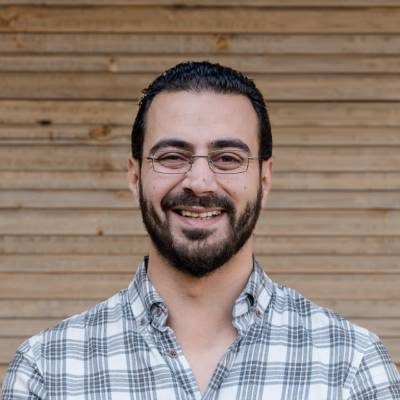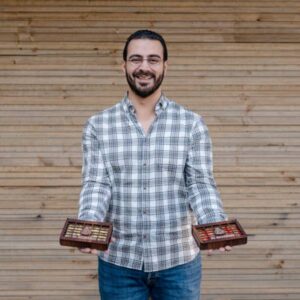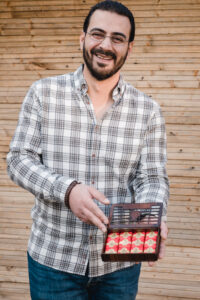
Founder/Owner
Name: Tarek Hazzouri
Organization: CEO Al Hazzouri Online Shop
Country: From Syria living in Germany
Description of the business idea
‘Delicatessen from Syria’
Al Hazzouri Online Shop – Established in September 2020.
Since he arrived in Germany from Syria in 2015, Tarek Hazzouri has had to overcome one obstacle after another with ambition and discipline. Some of them were just prejudices against refugees. Fortunately, everything suggests that the founder Tarek will not end up like Sisyphus.
It is November 2021. The web conference on the topic of “Start-up Financing for Refugees” was in full swing.
Over 50 people took part, including representatives from the banking industry and politicians. Tarek Hazzouri reported on his experiences of starting up his business and he took the floor, speaking in impeccable German. He described what everyone suspected, but is rarely spoken about so openly: after the feeling of “We can do it” and a phase of euphoria, disillusionment and everyday reality followed.
Reservations about the negative consequences of immigration have always made integration in Germany difficult, even though the social climate is slowly changing for the better. Tarek wishes that future founders with comparable refugee experience will find better conditions. “I have proposed solutions that will no longer be of use to me myself. But, maybe, they will help other people who want to start their own business,” said Tarek.
Even the normal challenges of the start-up phase can be a burden for entrepreneurs. Migration or refugee experience acts like an amplifier. “Despite my permanent residence permit and my language skills, I kept hearing the word ‘but’. That slowed me down,” is how Tarek sums up the experience.
Firstly, his engineering credits earned in Syria were not fully recognized. “The dispute got to the point where lawyers were involved. But instead of considering a lawsuit, I decided to focus on my business idea.” A lack of a university degree may be forgivable for someone choosing self-employment.
But it required a solid monetary foundation ie start-up financing – a tough nut to crack on Tarek’s path.
Pro Social Business helped the founder to draft a detailed business plan. When he presented it to the bank, however, he was met with scepticism. At that time, there was already uncertainty about what impact the pandemic would have on the envisioned business development. When the Syrian looks back on the failure of his talks about loan financing, he said “I hadn’t come in without collaterals.
But I also understand that a certain caution towards founders and new ideas is justified,”
Quite typical and yet quite individual.
We know from our practice that a large proportion of those migrant people who signal intentions to start a business, have been self-employed before. Tarek Hazzouri is no exception as he comes from a family of entrepreneurs.
Hazzouri’s father is a landscape engineer and successfully runs his own business in Syria against all odds. Tarek ventured into self-employment early on in his old homeland. Together with his brother, he produced ice cubes. The small company supplied the catering industry and bakeries that needed the ice to produce a regional bread specialty.
This business was going well – until he fled.
Tarek arrived in Germany, learnt the language, got a job and wanted to open a store in the centre of Speyer in 2019. His father would supply Syrian olive oil and other specialties from his own production for this. Among them, particularly exotic delicacies, for example, pomegranate molasses made in the traditional way. “These dried figs and dates are also not available here. I’m the first to import them!”
With Corona, the next obstacles unexpectedly came up on Tarek’s path and has consequences beyond the failure of borrowing: “I postponed the opening until later and from today’s perspective, I’m glad about the decision. I would have had to bear all the costs for the store directly, but it was unclear whether the Corona aid would have taken effect in my case yet.”
“Better to grow slowly than too fast”
Tarek Hazzouri observes how trade is increasingly shifting online during the pandemic. “Once you order online, you stick with it,” is his assessment, which gives him the courage to take up his idea again – only this time as an online store instead of a store. “Of course, it’s a shame when some goods are hardly available in stationary stores anymore.
But there are many advantages for customers online, and it’s usually cheaper, too.”
The “Al Hazzouri Online Shop” went online in April 2021. To realize his new idea, the founder used his own funds and finds family support. His brother, who is studying IT in Germany, set up the system with him. “The start was much easier than we thought. Domain secured, WordPress installed, Woocommerce set up and off we went.” The online retailer found mandatory tasks such as accounting, which he regularly takes further training, to be just minor obstacles. “I like to take things into my own hands. Then I know I understand them completely and keep control.”
His father continues to be the exclusive supplier.
“Through him, I guarantee the quality of my products,” says Tarek, who keeps them in stock in a small warehouse. Because of the ongoing civil war, they arrive in Germany overland. “The logistics are not a problem, it just takes a little longer,” says Tarek.
Word of the specialty store’s special product selection has got around in its first year of operation. Sales are going well, although no advertising has been done yet apart from referral marketing. Tarek takes a step-by-step approach to self-employment, preferring to “grow slowly rather than too quickly”. At the same time, he pursues other jobs and projects in order to have several legs to stand on. In this way, he feels armed against the risk of another obstacle to overcome.
Hopefully, it will not come to that.
We wish the “Al Hazzouri Online Shop” great success!
Provide a brief description of your business. What do you do in a nutshell?
I run the “Al Hazzouri Online Shop” for delicacies from Syria. First, I wanted to open my own store but because of the COVID pandemic in the end I started a online shop to sell goods my father grows in Syria.
Which sector does your business idea belong to?
Retail sector
Describe the opportunity: What problem does your business idea solve? What challenges and pain points are you resolving for users/customers?
I deliver special delicacies from Syria which aren’t available in Germany. I have customers from Syria who miss these products in Germany but also have new customers from other countries who are curious about foreign delicacies and use them e.g. as a special and exclusive gift.
Describe the company: What does your company do?
I import delicacies from Syria and sell them in Germany. My father is a landscape engineer in Syria and, against all odds, successfully runs his own business there. I sell Syrian olive oil and other specialties from his own production. These include particularly exotic delicacies, such as traditionally made pomegranate molasses.
Describe the Team: How many people were involved from the beginning? How were they involved?
My father and my brother are involved in the business. We already run our business together in Syria and now do it as an import business.
Describe the Target Market: Who is your target market? Who makes up your target audience?
On the one hand our target market are Syrian/Arabic people who know our products and miss them in Germany. But we also reach interested clients from all nationalities, e.g. people who are looking from special delicacies.
Implementation Timeline: Briefly, how did your business roll-out? Which phases were involved until it was up and running?
It took a long time as in the beginning I wanted to open up a store. Because of the pandemic situation plans changed and took longer in planning. With the help of Pro Social Business e. V. I created a very detailed business plan. In the end I was lucky about the situation and that I didn’t open a store but a online business. It took some time as there were a lot of bureaucratic hurdles such as getting a financing in Germany.
Funding Required: How much did it cost to begin approximately? Where did the initial funding go? How did you acquire that funding?
As mentioned above, I had difficulties in getting a financing. In the end, I had to use my own savings and needed help from friends and family.
Brief Financial Profitability Estimate: How long did it take for your business to become profitable?
It still takes time and I am working on different other projects.
Industry Analysis: What are some key elements related to being successful in your industry? What does your business have that your competitors don’t?
I have products other people don’t have. And as I use direct sales channels I can offer good prices and have an advantage on the market.
Legal Requirements: What are the basic legal requirements for someone to start this business in your country? Are there any licenses they need to obtain?
In my field there aren’t any licences. I actually choose the business and self employment as I had problem with the recognition of my studies from Syria in Germany.
Individual skills
Which hard skills and specific knowledge will the individual require to become successful if they implement your business idea?
It would be helpful to have direct connections to the home country and access to special products which aren’t available in the target market (because they are unknown or less known but special, with potential.)
Which soft skills will the individual require to become successful if they implement your business idea? (communication skills, leadership skills, etc.)
Well, I guess you need all the important skills a person who wants to be self employed needs: Communication skills, leadership skills, endurance, marketing skills and at least basic economic skills and – you have to believe in your idea.



